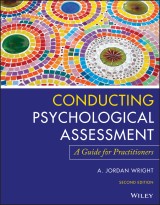Details

Conducting Psychological Assessment
A Guide for Practitioners2. Aufl.
|
61,99 € |
|
| Verlag: | Wiley |
| Format: | EPUB |
| Veröffentl.: | 13.10.2020 |
| ISBN/EAN: | 9781119687214 |
| Sprache: | englisch |
| Anzahl Seiten: | 400 |
DRM-geschütztes eBook, Sie benötigen z.B. Adobe Digital Editions und eine Adobe ID zum Lesen.
Beschreibungen
<p><b>Beginning-to-end, step-by-step guidance on how to conduct multi-method psychological assessments from a leader in the field</b></p> <p>The Second Edition of <i>Conducting Psychological Assessment: A Guide for Practitioners</i> delivers an insightful overview of the overall integrative psychological assessment process. Rather than focus on individual tests, accomplished assessment psychologist, professor, and author A. Jordan Wright offers readers a comprehensive roadmap of how to navigate the multi-method psychological assessment process.</p> <p>This newest edition maintains the indispensable foundational models from the first edition and adds nuance and details from the author’s last ten years of clinical and academic experience. New ways of integrating and reconciling conflicting data are discussed, as are new models of personality functioning.</p> <p>All readers of this book will benefit from:</p> <ul> <li>A primer on the overall process of psychological assessment</li> <li>An explanation of how to integrate the data from the administration, scoring, and interpretation phases into a fully conceptualized report</li> <li>Actual case examples and sample assessment cases that span the entire process</li> </ul> <p>Perfect for people in training programs in health service psychology, including clinical, counseling, school, and forensic programs, <i>Conducting Psychological Assessment</i> also belongs on the bookshelves of anyone conducting assessments of human functioning.</p>
<p>Preface vii</p> <p>Acknowledgments ix</p> <p><b>Part I Conducting Psychological Assessment 1</b></p> <p><b>Introduction The Hypothesis Testing Model</b></p> <p>Chapter 1 The Initial Clinical Assessment: Clinical Interviewing and Hypothesis Building 11</p> <p>Chapter 2 Selecting Tests 39</p> <p>Chapter 3 Testing 57</p> <p>Chapter 4 Integrating Data 65</p> <p>Chapter 5 Writing Reports 99</p> <p>Chapter 6 Providing Feedback 133</p> <p><b>Part II Case Studies in Psychological Assessment 147</b></p> <p><b>Introduction Case Studies in Psychological Assessment</b></p> <p>Chapter 7 A Woman With Poor Attention 151</p> <p>Chapter 8 A Woman With Interpersonal Problems 187</p> <p>Chapter 9 A Young Man Who Steals 229</p> <p>Chapter 10 An Adolescent Girl With Test Anxiety 265</p> <p>Chapter 11 An Aggressive Boy 301</p> <p>Chapter 12 An Adolescent Girl With School Problems 333</p> <p>References 381</p> <p>Index 387</p>
<p>“This new addition of Wright’s useful text is a tour de force. No one else writes more clearly, practically, and helpfully than Wright about psychological assessment—especially about the complex process of case conceptualization. This book should be required reading in every graduate course on psychological assessment.”</p> <p> </p> <p>Stephen E. Finn, Ph.D.</p> <p>Founder, Center for Therapeutic Assessment </p>
<p><b>A. JORDAN WRIGHT, P<small>H</small>D, ABAP,</b> is an assessment psychologist and faculty in the Counseling Psychology program at New York University, where he runs the Center for Counseling and Community Wellbeing, NYU's training clinic. He has published several books on assessment, including the <i>Handbook of Psychological Assessment</i> (6<sup>th</sup> edition, Wiley, 2016), <i>Essentials of Psychological Assessment Supervision</i> (Wiley, 2019), and <i>Essentials of Psychological Tele-Assessment</i> (Wiley, 2020). He is on the executive board of the American Board of Assessment Psychology, is a past board member of the Society for Personality Assessment, and is a past president of APA's Section IX (Assessment) of Division 12.
<p>Praise for <b>CONDUCTING PSYCHOLOGICAL ASSESSMENT</b> <p>"This new addition of Wright's useful text is a tour de force. No one else writes more clearly, practically, and helpfully than Wright about psychological assessment—especially about the complex process of case conceptualization. This book should be required reading in every graduate course on psychological assessment."</br> <b>—Stephen E. Finn, PhD,</b> Founder, Center for Therapeutic Assessment <p>"A. Jordan Wright's <i>Conducting Psychological Assessment</i> is a comprehensive step-by-step guide to every aspect of psychological testing and assessment. Blending clinical wisdom with rigorous empirical evidence, the author guides readers though every phase of the assessment process, from selecting appropriate measures and collecting test data through writing assessment reports and providing feedback to clients. Experienced clinicians, early career psychologists, and students will all benefit from this important book; it should be on every clinician's bookshelf."</br> <b>—Robert F. Bornstein, PhD,</b> Derner School of Psychology, Adelphi University <p><i>"Conducting Psychological Assessment</i> (2<sup>nd</sup> ed) provides a clear, concise, practical guide to essential aspects of clinical assessment. Dr. Wright presents scholarly research, draws on extensive clinical experience, and illustrates his guidelines with rich case examples. Much of this information is typically not included in other assessment books, such as how to select tests, strategies to integrate contradictory data, and how to work with clients who disagree with assessment results. Accordingly, I recommend this to all health professionals involved with clinical assessment."</br> <b>—Gary Groth-Marnat, PhD,</b> ABPP, ABAP
Diese Produkte könnten Sie auch interessieren:

Cognitive-Behavioural Therapy for ADHD in Adolescents and Adults

von: Susan Young, Jessica Bramham

41,99 €

Cognitive-Behavioural Therapy for ADHD in Adolescents and Adults

von: Susan Young, Jessica Bramham

41,99 €

Offenders with Developmental Disabilities

von: William R. Lindsay, John L. Taylor, Peter Sturmey

53,99 €













